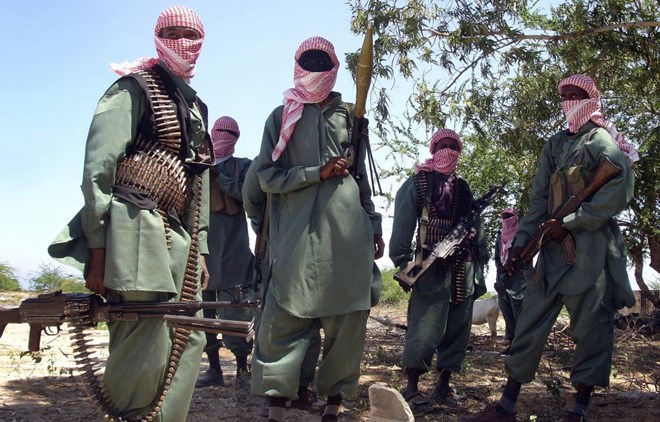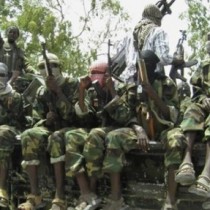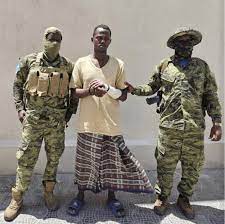
Somali terror group al-Shabab's ambitions grow

Wednesday March 9, 2016

Somalia's al-Shabab movement is emerging as one of the most loyal — and lethal — al-Qaida affiliates, even as the Islamic State expands its reach in the region, according to Western and Somali analysts.
The concern is so great that U.S. warplanes and drones attacked an al-Shabab training camp Saturday, killing more than 150 fighters, according to the Pentagon. It was the deadliest U.S. strike on the terrorist group since it emerged a decade ago with the goal of turning Somalia into a fundamentalist Islamic state.
"Al-Qaida understands the potential of this self-financing and experienced insurgency in the strategic Horn of Africa,” said Abdirashid Hashi, director of the Heritage Institute for Policy Studies, a think tank based in the Somali capital, Mogadishu. "And ISIS, of course, understands this potential and hence its overtures for co-option or stage a hostile takeover.
"Al-Qaida is probably working hard to protect its jewel from ISIS.”
Less than two years ago, al-Shabab was a crippled movement. U.S.-backed African Union forces had driven the militia out of Mogadishu and other areas. Their leader, Mukhtar Abu Zubeyr, widely known as Ahmed Abdi Godane, was killed in an American airstrike, a year after he masterminded an attack on a posh Nairobi mall that killed scores. His death was hailed by U.S. officials as a major operational and symbolic blow to the militia that would fragment it and eventually lead to its demise.
Instead, the militia regrouped under a new leader, Ahmad Umar, and transformed itself into a lethal guerrilla insurgency. Its fighters have raided areas of the countryside, setting up roadblocks and controlling the population. They have expanded their recruitment and presence in Kenya and other neighboring countries. They have been aided by incessant political infighting, poorly trained and equipped national security forces and a weak central government that has not been able to fill the void.
Thinly stretched African Union peacekeepers, known by their acronym AMISOM and funded by the United States and other Western governments, seldom pursue the militia into rural areas, focusing control on cities and towns. That has allowed the terrorists to stage spectacular attacks from their rural strongholds, including suicide and roadside bombings against the government, the United Nations and African Union military bases.
Al-Shabab has attacked restaurants, beachfront bars and other soft targets while dispatching assassination squads to eliminate government officials.
"Al-Shabab is dominate in the countryside in the newly liberated areas, where neither AMISOM nor the Somali army so far have been successful in establishing security for the locals,” said Stig Jarle Hansen, a Norwegian researcher who authored a book on the group. "In these areas, they can tax and even use forced recruitment.”
Since January, the militia has killed scores of people, including Kenyan soldiers attached to AMISOM at their base and guests at a Mogadishu hotel. It asserted responsibility for a bomb planted on a jetliner that ripped a hole through the fuselage, forcing the plane to land in Mogadishu, and a bomb that detonated in a laptop Monday at the airport in the central Somali town of Beledweyne.
While U.S. officials described Saturday's airstrikes as a major success that apparently killed more terrorists than all previously known U.S. operations in Somalia combined, some analysts expressed caution. The presence of such a large number of fighters at one camp is "a worrying indicator of the group's continued relevance and its power to attract, notwithstanding the setbacks it has suffered in recent years,” said J. Peter Pham, director of the Africa Center at the Atlantic Council.
"If anything, despite the killing of several of its leaders and battlefield reverses the group has suffered, its hard-line ‘core' has become even more radicalized and, indeed, have seen their ambitions grow,” he added.
As it has rallied, the militia has drawn the attention of the Islamic State. In videos and social media, Islamic State leaders have urged al-Shabab to abandon al-Qaida and join their fold, part of an ongoing contest for influence between the two most influential terrorist groups.
Last year, Nigeria's Boko Haram militia pledged allegiance to the Islamic State. That was considered a setback for al-Qaida's central branch in Pakistan and Afghanistan, which has increasingly relied on local and regional affiliates to spread its radical philosophies.



 0
0 














Somali terror group al-Shabab's ambitions grow
The Somali terrorists have shown signs of resurgence, staging deadly attacks and assassinations in recent months, despite the billions of dollars being spent by the United States to fight them. That has prompted the Islamic State to try to woo them a